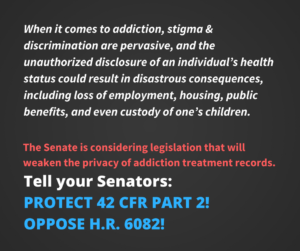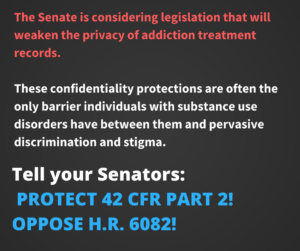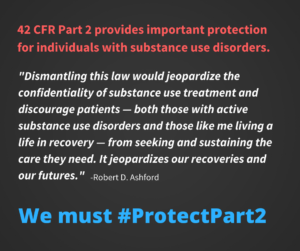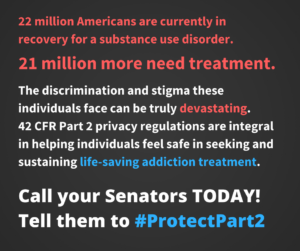UPDATE: March 4th 2020
Action alert: Stand up for Patient Consent Oppose US Senate Bill 1012 Erosion of SUD Patient Privacy Protections
Stand up for Patient Consent Oppose US Senate Bill 1012 Erosion of SUD Patient Privacy Protections
What is needed: CALL YOUR US SENATORS TODAY TO MAINTAIN PATIENTS’ RIGHT TO CONSENT AND PROTECT PEOPLE WITH SUBSTANCE USE DISORDERS FROM DISCRIMINATION
Please download this action alert located here
Call your U.S. Senators through the U.S. Capitol switchboard at (202) 224-3121.
Find out the names of the two U.S. Senators in your state: https://www.senate.gov/senators/contact
- It would remove consent requirements for the use of SUD Patient records and opens up people with substance use conditions to discrimination by using the weaker law HIPAA (the Health Insurance Portability and Accountability Ac). HIPAA has no protections against the use of information related to illegal drug use.
- The Bill has language that opens the door for compelled disclosure for patient information to be used to discriminate against people with substance use conditions.
- Many individuals needing substance use disorder treatment will likely not go or stay in treatment – if they know their private health information can be shared with others without their consent.
The bill in question (S. 1012) has the same dangerous provisions that were pending in a previous Congressional session (in H.R. 6082). Specifically, both use a weaker confidentiality law (the Health Insurance Portability and Accountability Act (“HIPAA”)) and permit the release and re-disclosures of SUD medical record information for “treatment, payment, and health care operations” purposes – without the patient’s consent.
UPDATE: March 2nd 2020
Alcohol and Drug Abuse Weekly issue for March 2, 2020 calls actions on changing Federal Confidentiality Regulations a “Cover Up”
ADAW article LINK HERE
From the article
Cover up: No patient Voices in SAMHSA “summary” of 24 CFR Part II NPRM” and the referenced presentation.
- The article indicates that the vast majority of public comments submitted about the rule change were opposed to the changes.
- Despite overwhelming negative feedback, MITR, the company contracted by SAMHSA to summarize public comment excluded the entire national recovery community in the summary, instead focusing on 24 “prominent” organizational responses, from groups like CIGNA, United Healthcare Group, the American Hospital Association and the American Health Information Management Association.
- The Former Director of SAMHSAs Center for Substance Abuse Treatment, Dr H Westley Clark, MD JD called the presentation that excludes the voice of recovering people “quite shocking.”
- Executive Director William Stauffer is quoted in this article stating: ““I am deeply concerned about the review of Part 2 NPRM comments,” said Bill Stauffer, speaking for Faces & Voices of Recovery. “How are ‘prominent’ organizations defined and who gets to define who makes that list? It is totally inappropriate to discount comments by ‘non-prominent’ commenters, like patients, people in recovery and recovery community organizations. The very people that these rules and the regulatory process are intended to protect are being excluded in this process. It is a bit demoralizing and deserves independent scrutiny.”
- These protections are tantamount to civil rights for members of the recovery community.
We are not asking for any specific action from the field at this time and will report on any further developments.
We note that it would be inappropriate for industry groups to be seen as the primary stakeholders instead of the people directly impacted by these proposed changes who are asking that their privacy rights be protected.
We are hoping that SAMHSA clarifies that the large number of responses opposed to the changes be counted and that any movement on these proposed changes be put on hold until a neutral contractor who is willing to include our voices be found and the responses re-tabulated without bias.
Drug and Alcohol Patient Privacy Rights still under attack:
OUR WORK IS NOT DONE YET
SECOND CALL TO ACTION!
NPRM #2: Proposal 0930-AA32 COMMENTS DUE by 10/25/19 at 5pm Eastern!
Thank you for your work on “round one”. We still need your comments to preserve patient privacy and effective treatment. To comment on this vital matter, please visit https://www.regulations.gov/comment?D=HHS-OS-2019-0011-0001. PART 2 is still under threat. A second comment period has opened. This commenting period ends on 10/25 at 5 PM, Eastern time.
A number of entities including the electronic records industry, and the insurance are pushing for these changes. What are the changes that will harm patients and remove clinical decision making from the programs that serve us:
- Removal of Re-disclosure Prohibitions
- Disclosures to Central Registries and PDMPs
- Removal of Clinical Management of Care by Treating Providers
- Undercover Agents and Informants
See our Agency’s formal stance on this matter at https://pro-a.org/wp-content/uploads/2019/10/1-PRO-A-NPRM-0930-AA32-comment-to-SAMHSA.pdf.
Learn more at https://pro-a.org/drug-and-alcohol-patient-privacy-rights-still-under-attack-comment-by-10-25-19/.
Submit your comments at https://www.regulations.gov/comment?D=HHS-OS-2019-0011-0001. This commenting period ends on 10/25 at 5 PM, Eastern time.
UPDATE: September 13, 2019
The Federal Government is proposing a change that gives law enforcement more access to SUD patient records!
This change to Section 2.63 of 42 CFR Part 2 could harm the lives of patients and people in recovery in an extraordinary way…
Imagine if your SUD patient records could be used to deny you insurance, be used in a court of law against you, or be shared against your will. With the realignment of 42 CFR Part 2 with HIPPA, our patient confidentiality is at stake.
...this will open all patient records to law enforcement and would allow patient records for all treatment centers to be used to investigate the patient, the programs and information contained in the records on potential illegal conduct of family and others not in treatment.
There are steps you can take to protect the rights of you, your loved ones, and others like you. There are many concerned parties who have put together material, websites, and fact sheets to help people understand this issue. We have compiled this information, along with links to access the information on a shareable and print friendly version in a PDF format available at https://pro-a.org/wp-content/uploads/2019/09/Protect-Patient-Privacy-Now.pdf. This resource is public domain and can be used to help others understand the matter.
UPDATE: August 26, 2019
The Federal Government is seeking to radically expand access to substance use disorder patient records to law enforcement. It is critically important that you to read the NPRM (Notice of proposed rulemaking) and formulate responses through your networks of connections.
NPRM (Notice of proposed rulemaking) – Regulatory Information Number 0930-AA30: https://www.govinfo.gov/content/pkg/FR-2019-08-26/pdf/2019-17816.pdf
- Deadline for submitting public comments: by 5 pm on September 25, 2019.
- There are two proposed NPRMs for confidentiality – this is the shorter of the two with public comment due first. Interpretations of these changes are that they are a serious threat to care for the recovery community. More information will be provided at a later date on the second set.
- We urge you to read the attached NPRM and set up your own processes to submit comments and conduct your own efforts to get responses. Comments may be submitted by:
- Federal eRulemaking Portal: You may submit comments electronically at http://www.regulations.gov. Follow the instructions for submitting comments. This is the preferred method for the submission of comments.
- Mail: Written comments must be sent to the following address:
- Attn: Mitchell Berger
SAMHSA
5600 Fishers Lane, Room 18E89C
Rockville, MD 20857 - Attn:Suzette Brann
SAMHSA
5600 Fishers Lane, Room13E01B
Rockville, MD 20857
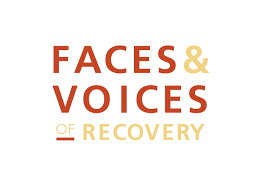
Recovery community talking points on SUD privacy rights:
Substance Use Disorder (SUD) federal Patient Privacy rights in 42 CFR Part 2 are under attack. What is at risk is your right to consent (or not consent) to release your highly sensitive SUD related information and to decide who gets it. Please see these suggested talking points for you to use as members and friends of the recovery community.

This article with quotes from PRO-A Executive Director William Stauffer titled “Onslaught against 42 CFR Part 2 continues in Congress” in PDF form linked below is being shared with the permission of Alison Knopf, editor of Alcoholism & Drug Abuse Weekly. It was first published on April 21, 2019. PDF of article here.
“Onslaught against 42 CFR Part 2 continues in Congress” Article Abstract: “With the opposition of the American Medical Association (AMA) last fall, any moves in Congress and the federal government to weaken the patient consent provisions of 42 CFR Part 2, the regulation protecting the confidentiality of substance use disorder (SUD) treatment records, were stopped in their tracks — and in the nick of time (see ADAW, Oct. 1, 2018; Oct. 15, 2018). But the groups promoting the complete abandonment of 42 CFR Part 2, replacing it with the Health Insurance Portability and Accountability Act, which itself is targeted for at least partial destruction (see ADAW, Jan. 21, Jan. 28, Feb. 25), are back. There’s a new push to try to overhaul 42 CFR Part 2.”
Alcoholism & Drug Abuse Weekly is the premier weekly publication for people interested in the SUD service system and related policies and delivers the latest news and research on substance abuse and recovery. It keeps readers up to date on the field, and delivers analysis and implications for practice, please consider subscribing to this weekly publication for the latest news on substance use treatment and recovery issues! To learn more about Alcoholism & Drug Abuse Weekly, please follow this link: https://onlinelibrary.wiley.com/journal/15567591

The Pennsylvania Recovery Organizations – Alliance is adding our voice to those across our nation in opposition to the dismantling of our lifesaving drug and alcohol confidentiality rights as proposed under the Overdose Prevention and Patient Safety Act (HR 3545). The Bill would eliminate the rights we have had under the law for over 40 years to decide what happens to our sensitive drug and alcohol information in federally assisted programs.

We represent thousands of recovering persons across the state of Pennsylvania. We are dedicated to ending stigma, providing public education about addiction, providing recovery opportunities and to expand access to drug and alcohol services. We are deeply concerned about the potential impact of HR 6082, the Overdose Prevention and Patient Safety Act would have on our community. We are already hearing of cases in which people are leaving or avoiding treatment as news of this Bill gets out. Submitted on July 18, 2018, read our letter in opposition, with additional details, here.
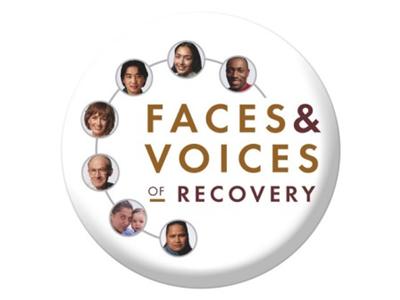
Faces & Voices of Recovery, the nation’s leading recovery advocacy organization since 2001, aims to reduce the discrimination that keeps people from seeking recovery or moving on to better lives once they achieve it; and supports recovery-oriented policies and programs. They represent the voice of the over 23 million Americans in long-term recovery from alcohol and other drug addiction, and their families. As an organized voice protecting the rights of individuals with substance use disorders, Faces and Voices of recovery are adamantly opposed to the dismantling of our critically important 42 CFR Part 2 confidentiality protections and are opposed to the dismantling of the existing Public Health Law- which authorizes 42 CFR Part 2. See the full statement from Faces & Voices of Recovery here.
Confidentiality in the News:
- This article with quotes from PRO-A Executive Director William Stauffer titled “Onslaught against 42 CFR Part 2 continues in Congress” in PDF form linked below is being shared with the permission of Alison Knopf, editor of Alcoholism & Drug Abuse Weekly. It was first published on April 21, 2019. PDF of article here.
- Stat News opinion piece written by Robert D. Ashford, a person in long-term recovery, about his concerns regarding the pending House legislation: https://www.statnews.com/2018/07/19/treatment-privacy-laws-addiction-recovery/
- Congress should listen to addiction patients — not corporate interests — about confidentiality By H. WESTLEY CLARK AUGUST 13, 2018 https://www.statnews.com/2018/08/13/congress-addiction-patients-health-records-privacy/
- The Hill opinion piece written by the Legal Action Center and the American Association for the Treatment of Opioid Dependence: Relaxing patient privacy protections will harm people with addiction BY DEBORAH REID AND MARK PARRINO, OPINION CONTRIBUTORS — 07/22/18 http://thehill.com/opinion/healthcare/398077-relaxing-patient-privacy-protections-will-harm-people-with-addiction

Additional Resources:
Fact Sheet for the Legal Action Center, Protections People would Lose if HIPAA Becomes the Standard for Substance Use Information: https://lac.org/wp-content/uploads/2017/09/Part-2-and-HIPAA-Facts-Final.pdf
Social Media Resources:

Twitter – https://twitter.com/
Great op-ed by the venerable Dr. H. Westley Clark: Congress should listen to addiction patients — not corporate interests — about confidentiality. “Policymakers would be wise to listen to those closest to the problem — patients and people in recovery” via @statnews #RecoveryVoicesCount #ProtectPart2 #PrivacyRights
“Time has proven people being treated 4 #substanceusedisorders need additional privacy protections…No other medical condition evokes same societal prejudice or sanctions.” This is why (your organization’s handle) joins with over 100 organizations to #ProtectPatientPrivacy #ProtectPart2
Facebook – https://www.facebook.com/
Important op-ed by Dr. H. Westley Clark: “Unfortunately, many legislators in the nation’s capital are ignoring the voices of people directly affected by people with substance use disorders. The Overdose Prevention and Patient Safety Act (H.R. 6082) is an example of a “solution” that represents the interests of corporate entities and those who would profit off the information about people in treatment or recovery.” (tag other orgs, including StatNews)
